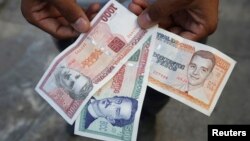The United States is clearing the path for more travel and commerce with Cuba as it seeks to further engage the Cuban people and normalize relations with the island nation.
The Obama administration on Tuesday announced a series of actions it says will promote ties between U.S. and Cuban citizens and urged the communist government to do its part to “remove impediments that have been holding Cubans back.”
Steps taken by the U.S. Treasury and Commerce Departments include removing financing restrictions for most types of authorized exports, amending regulations to make it easier for some individuals and entities to get export licenses, and further easing regulations on authorized travel.
The White House said the new actions to ease sanctions continue a policy to empower the Cuban people by creating economic opportunities between Cubans and Americans.
“By expanding people-to-people ties, business opportunities, and greater access to information, we are promoting the transformation of our relationship in ways that advance U.S. interests and improve the lives of the Cuban people,” the White House said.
The U.S. urged the Cuban government to take steps to make it easier for Cuban citizens to start businesses, engage in trade and access information online.
During a speech in Havana, U.S. Ambassador Daniel Sepulveda urged Havana to expand Internet and communications connectivity .
While the government has taken some “positive steps” in the last year, Sepulveda urged Cuba to upgrade its wireless technology, establish more Wi-Fi hotspots and lower the cost of Internet access, which is $2.00 an hour. That effectively means that it costs the average Cuban about 10 percent of his or her salary to get online, Sepulveda said.
Treasury Secretary Jacob Lew said Tuesday the U.S. will continue to take steps to “help the Cuban people achieve the political and economic freedom that they deserve.”
Commerce Secretary Penny Pritzker said the regulatory changes will “help strengthen civil society in Cuba and enhance communications to, from and among the Cuban people.”
In December 2014, President Barack Obama announced the United States would re-establish diplomatic relations with Cuba and begin the process of normalizing relations more than 50 years after they severed ties.
The policy change is sharply opposed by many in the Republican-led Congress and by some Republican presidential hopefuls, including former Florida Governor Jeb Bush and Florida Senator Marco Rubio, who has threatened to reverse the change in U.S.-Cuba relations.
Critics argue Obama gave Havana too many concessions without insisting the communist government bring an end to its oppressive policies and human rights abuses.





